
Christopher Eugene Brooks. (Alabama Department of Corrections via AP)
ATMORE, Ala. – A man convicted of the 1992 rape and beating death of a woman is scheduled to receive a lethal injection Thursday in what would be Alabama's first execution in more than two years.
Christopher Eugene Brooks, 43, is set to die at 6 p.m. CST at Holman Correctional Facility in Atmore, authorities said.
He was convicted of the 1992 capital murder of 23-year-old Jo Deann Campbell, a woman he first met when they worked as camp counselors in upstate New York. A judge sentenced him to die after a jury recommended a death sentence by an 11-1 vote.
Campbell was seen speaking to Brooks at a restaurant where she worked on Dec. 30, 1992, and she later told a friend that someone was spending the night in her living room, according to witnesses. The next day, Homewood police found Campbell's partially clothed body under the bed of her Homewood apartment. Prosecutors said she had been bludgeoned to death with an 8-pound dumbbell and sexually assaulted.
Brooks' bloody fingerprint was on a doorknob in Campbell's bedroom and a latent palm print on her ankle, according to court records. The documents say Brooks also was found later with Campbell's car keys and had cashed her paycheck and used her gas station credit card.
While DNA testing was at its infancy at the time, prosecution witness said semen found on the victim's body was consistent with Brooks' DNA.
At trial, defense lawyers argued that another man who was at the apartment that night might have committed the murder.
Alabama's last execution was in 2013. Execution drug shortages and litigation prevented the state from carrying out death sentences in the time since.
Authorities said it would be the first execution since Alabama announced in 2014 that it was changing two of the three drugs in its procedure, including a switch to the sedative, midazolam, to render the inmate unconscious.
Lawyers for the state have argued Alabama's new drug combination is "virtually identical" to the one Florida has used multiple times without incident. But attorneys for Brooks argued that midazolam was used in problematic executions including one in which an Oklahoma inmate took 43 minutes to die.
The U.S. Supreme Court -- in a split decision last June -- allowed Oklahoma to proceed with the use of midazolam. Six Alabama inmates argue in an ongoing lawsuit that it is an ineffective anesthetic and that they will feel the effects of the subsequent injections of rocuronium bromide and potassium chloride stop their lungs and hearts.
On Wednesday, an attorney for Brooks asked the U.S Supreme Court to halt the planned execution, arguing further court review of the state's execution protocol is needed before it is used for the first time.
"Brooks should not be the subject of Alabama's experiment to see if it can carry out an execution using this protocol while the very validity of the protocol is at issue in ongoing federal court proceedings," Assistant Federal Defender John Palombi wrote in the filing to the Supreme Court.
Brooks' attorney also asked the Supreme Court to review the case after justices last week ruled Florida's system for sentencing people to death is unconstitutional because it gives too much power to judges to decide capital sentences.
Lawyers with the Alabama attorney general's office argued in court filings that Brooks was simply trying to delay his execution. A jury convicted him in 1993 of capital murder for murder committed during the course of a robbery, burglary, and rape.
"Brooks raped and murdered Jo Deann Campbell on December 31, 1992 and her family has been waiting for justice for more than twenty-three years," lawyers for the state wrote.
The last inmate put to death in Alabama was Andrew Reid Lackey, who died by lethal injection on July 25, 2013, for killing Charles Newman during a robbery in 2005. At the time, he was the first inmate put to death in the state since October 2011.

